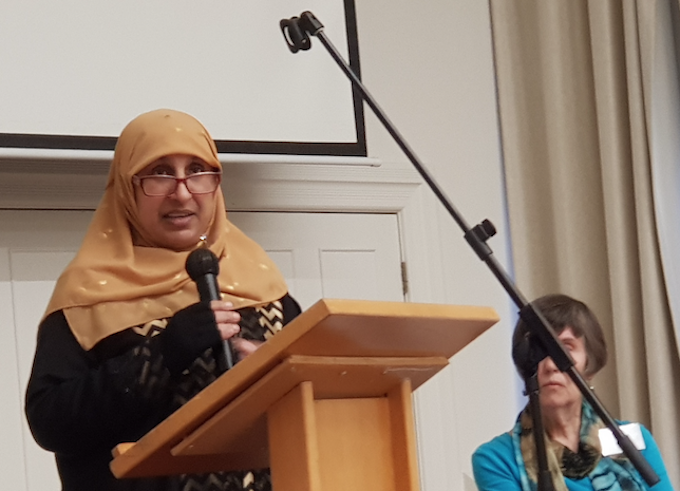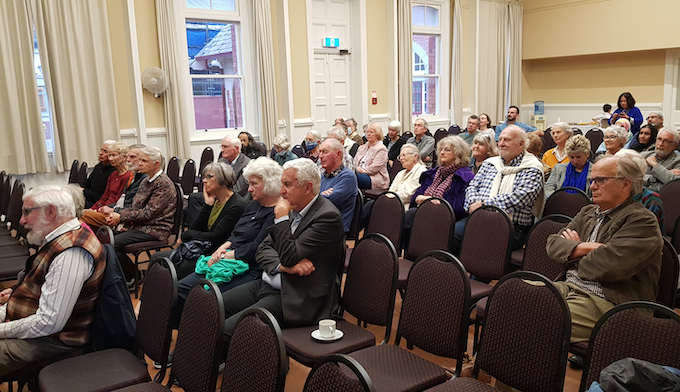
By David Robie
A human rights advocate appealed tonight for people in Aotearoa New Zealand to take personal responsibility in the fight against disinformation and to upskill their critical thinking skills.
Anjum Rahman, project lead of the Inclusive Aotearoa Collective Tāhono, said this meant taking responsibility for verifying the accuracy and source of information before passing it on and not fuelling hate and misunderstanding.
“Our democracy is very fragile,” she warned while delivering the annual David Wakim Memorial Lecture 2022 with the theme “Protecting Democracy in an Online World” at Parnell’s Jubilee Hall.
She said communities were facing challenging and rapidly changing times with climate change, conflicts, inflation and the ongoing pandemic.
“If our democracy fails, all those other things fail as well,” she said.
“And for those of us who are more vulnerable it is a matter of life and death.
“Who most stand to lose their freedom if democracy fails? Who will be on the frontline to be exterminated?”
Rahman is co-chair of the Christchurch Call Advisory Network and a member of the Independent Advisory Committee of the Global Internet Forum for Countering Terrorism.
Argued strongly for diversity
As an advocate, she has argued strongly for many years in support of diversity and inclusion and in 2019 was made a member of the New Zealand Order of Merit.
On the third anniversary of the 15 March 2019 mosque massacre, she wrote in a column for The Spinoff that “we don’t need any more empty platitudes of sorrow . . . we need firm action and strong resolve. Across the board.”
The David Wakim Memorial Lecture 2022. Video: Billy Hania
The recommendations of the Royal Commission of Inquiry were more critical now than ever, and absolutely urgent, she wrote.
“In a world that feels chaotic, with war, rising prices, anger and hate expressed in protests across the world, our hearts seek a certainty that isn’t there.
“We need more urgency, and in many areas. I’m still disappointed with the Counter-Terrorism legislation passed last year, granting greater powers without evidence of any benefit. Hate speech legislation has been delayed, and we await a full review and overhaul of the national security system.”
A founding member of the Islamic Women’s Council of New Zealand, Rahman gave a wide-ranging address tonight on the online challenges for democracy, and answered a host of questions from the audience of about 100.
“I’m really worried about trolls,” said one. “They affect government, they influence voters, they have an impact on all sorts of decision making – what can be done about it?”
Rahman replied that it was very difficult question – “I wish there was a simple answer.”

Removing troll incentives
She said there needed to be more education and greater awareness of the activities of trolls and the sort of social media platforms they operated on.
One problem was that the more attention paid trolls got, it often meant the more money they were getting.
A challenge was to remove the incentive being given to them.
Award-winning cartoonist Malcolm Evans asked Rahman what her response was to the global situation “right now” with the invasion of Ukraine where people were “under intense pressure to vilify the Russians . . . treating them as ‘evil’.”
He added that “we live in a time that is probably the most dangerous that I have experienced in my lifetime … we are facing an Armageddon and I blame the media for that.
“It’s a disgrace.”
This led to a discussion by Pax Christi Aotearoa’s Janfrie Wakim about how Evans lost his job as a cartoonist on The New Zealand Herald in 2003 for “naming Israeli apartheid” over the repression of Palestinians to the loud applause of the audience.
‘Quality journalism’ paywalls
In a discussion about media, Rahman said she was disturbed by the failures of the media business model that meant increasingly “quality journalism” was being placed behind paywalls while the public that could not afford paywalls were being served “poor quality” information.
Introducing Anjum Rahman, Pax Christi’s Susan Healy said how “especially delighted the Wakim whanau were” that she had agreed to give the lecture.
David Wakim was the inaugural president of Pax Christi Aotearoa, an independent section of Pax Christi International, a Catholic organisation founded in France at the end of World War Two committed to working “to transform a world shaken by violence, terrorism, deepening inequalities, and global insecurity”.
Growing up in a Sydney Catholic family, Wakim was an advocate of interfaith dialogue. His travels in Muslim countries strengthened his links with the three faiths of Abraham – Judaism, Christianity and Islam.
He helped establish the Council of Christians and Muslims in Auckland, but was especially committed to Palestinian rights.
Wakim died in 2005 and the annual lecture honours his and Pax Christi’s mahi for Tiriti o Waitangi, interfaith dialogue, peace education, human rights and restorative justice.














































